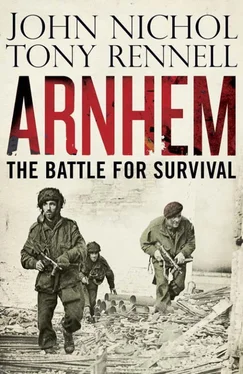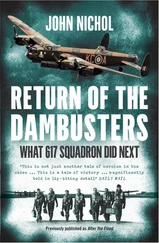On 22 October – five weeks after the Battle of Arnhem had ended – Pegasus was on. The hidden men who would join the escape were carefully brought together, converging on a wooded area near the river, close to the village of Renkum. They came in small parties, some on foot and some by bicycle, with Dutch guides. ‘Digby T is doing wonderful work,’ Lathbury noted. He said goodbye to the Dutch family who had been sheltering him and then, with Tatham-Warter, he cycled 6 miles to the assembly area. ‘We passed many German troops and it gave one a nasty feeling to think that we might be stopped at any moment. There was one particularly unpleasant-looking SS man who seemed to look right through me.’ The rendezvous was in a thick pine wood, where men were arriving throughout the day. ‘They were organized into platoons and sections under officers and NCOs, since what lay ahead was a difficult night move through enemy lines. Order and control were essential. An added difficulty was that many of the men were unfit and weak through shortage of food and exercise or, like me, were recovering from wounds. All of us had some portion of uniform with us so that we should be treated as soldiers in the event of capture. Most of us were armed.’
The distance from the assembly point to the river was 3 miles and, given the difficult nature of the terrain, three hours were allowed so as to be at the river at midnight. As it got dark and the 9 p.m. start time approached, one party of men had yet to arrive. They were coming from the far side of Arnhem, a difficult 10-mile drive through German lines. ‘It seemed impossible that they could ever reach us, without detection. However, at about 8.30 p.m. there were loud noises of motor vehicles approaching, followed by shouting in English. I felt sure that we would be discovered at any moment since there was a German battery position just a quarter to half a mile away. But all remained quiet.’
In charge of that particular party was Tony Hibbert, who had gone out from Ede to round them up. [9] How many were in the party is disputed. Lathbury says thirty; Hibbert, sixty.
‘We travelled in two magnificent old charcoal-burning lorries, open and with sides about 2 feet high. As we were all in British uniforms, it seemed unwise to sit boldly upright and we lay down in two layers with potato sacks on top. It was rough on those at the bottom as the lorries had few, if any, springs. No wonder there was some reluctance to volunteer for the bottom layer.’ The journey was not without incident. They passed through two German checkpoints before stopping in a clearing in the woods. ‘I went round to the back and said, “Everybody out, and keep bloody quiet because there are Germans all round here.” Needless to say, as they climbed out, there was a certain amount of “Fuck you,” “Christ, watch out,” “Prison camp would be better than this!” Just then, a German cycle patrol came along with a lot of tinkling of bicycle bells and cries for us to get out of the way. The troops politely stood to one side and allowed them to pass. The German patrol didn’t seem to notice a thing!’
With all now present, the escape could get under way. ‘We formed up into a column in single file,’ Lathbury recalled. ‘It was pitch dark and one could hardly see more than a few feet. Part of the journey was through thick woods, and extremely difficult. Those of us at the rear found it very difficult to keep up. Everyone was frightened of getting lost and, eventually, a rope was passed back and we all held on to it.’ Silence had been ordained, ‘but we seemed to make the most shattering noise’. The trickiest manoeuvre was crossing a road near some houses and going through a gate into the meadows near the river. ‘Our boots made a terrible noise on the tarmac, but still nothing happened. A slight moon began to shine through the clouds and additional light came from some burning buildings in the village of Renkum, just as we were passing through the enemy’s forward defences.’ Hibbert was astonished that they weren’t detected. ‘We were climbing over hedges and dropping down ditches about 8 feet deep and up the other side. The Germans must have heard us, and probably did see us, but maybe they felt that anyone who was making that amount of noise must be one of their own patrols. Either that, or there were so many of us that they felt the sensible thing to do was to keep quiet, because if they started shooting they would probably get shot at even harder.’
Ahead now was the river, half a mile or so away. They dropped to their knees and crawled over the meadow, stopping frequently while the way was scouted. Nerves were frayed, Lathbury recalled. Discipline wavered a little. Word from the front of the column was that lights were flashing from nearby German positions, and a ripple of apprehension went down the line that they had been discovered. Men braced themselves for an ambush on this last lap to the river. ‘Firing broke out in front and we all expected the worst. It turned out that our leading patrol had encountered a German reconnaissance patrol who had fired at them but then withdrawn. After a very nervous five minutes we hit the river and, almost immediately, British guns opened up from the other side with tracer, as arranged. It was midnight. We flashed back the agreed light signal across the water. Nothing happened. No boats. No sign of movement. We waited for an awful twenty minutes.’ Lathbury felt he had been here before. ‘As one who was on the beaches of Dunkirk I am convinced that there is nothing more demoralizing than waiting to be taken off from the wrong side of a water obstacle.’
What had gone wrong? Had they come to the wrong spot on the river bank? Should they move position? Upstream or downstream? How long did they dare to wait out there in the open before pulling out and taking cover? These were anxious moments. Then, ‘out of the darkness, we heard a cheerful, confident American voice hailing us. His boats were a quarter of a mile downstream. The relief was indescribable as we moved down the river bank in complete but cheerful disorder. Half an hour later the last boat was across, and not a sound from the enemy.’ They had made it. Six weeks since dropping from the sky behind German lines, they were at last back on their own side. For Hibbert, the joy of escape was marred by an accident. ‘We were ferried away from the river bank by jeeps, and I volunteered to sit on the front bonnet to guide the driver as, of course, there were no lights. We were going fairly fast when we went slap into another jeep coming from the opposite direction. If I hadn’t moved my legs in time, they would have been chopped off at the knee. As it was, I did a triple somersault, landed in the road and bust my leg, and spent the next five months in hospital. A thoroughly unsatisfactory battle ended in a thoroughly unsatisfying anti-climax.’ An impressive military career was cut short, and he was subsequently invalided out of the army.
Hibbert’s accident apart, Pegasus was a success, which was why it was repeated a month later for another batch of evaders, but this time with disastrous consequences. The Germans were on the alert, the evaders ran into ambushes and were captured, killed or scattered. Almost none got over the river. No one should ever underestimate how difficult it was for the Arnhem survivors to get out of enemy-occupied territory and back to their own lines. There were heroic individual escapes in the months to come, but many of those in hiding had to stay that way until the war was virtually over. Lieutenant Eric Davis was one of them. His legs were shot up at Oosterbeek and he had gone into German custody while being treated at the field hospital in the Tafelberg Hotel. He could barely walk, and his fellow patients at Apeldoorn urged him to accept his fate as a prisoner of war. He refused to listen. ‘I’ll be drinking beer in London while they’re caged up in Germany,’ he told himself. Put on a train for Germany, ‘I had an altercation with the guards about the war and was darned nearly brained with a rifle butt. Felt I was still fighting the war and determined to escape now. There is no doubt I am still feeling very aggressive.’
Читать дальше












